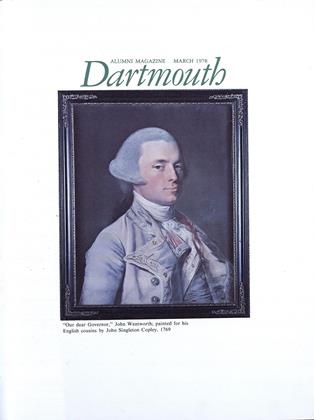To read this collection of public addresses is to learn much of a remarkable man. That he was also president of a remarkable college seems of secondary importance by the time one lays down the book. For what comes through is not so much the public official, the 12th president of Dartmouth College, as the man John Dickey: Significantly, these Commencement and Convocation speeches show us human, not official, qualities.
But the book has yet another dimension. To have read it is also to have experienced no small part of the social history of our time. During the Dickey years the Dartmouth experience was also to an unprecedented degree the national experience as the College and its president, along with everyone else, slogged from crisis through crisis to crisis: the Cold War, McCarthyism, Vietnam, race prejudice, social injustice, student revolt: the sorry litany goes on. The "great issues" of those 25 years hover palpably behind these addresses from start to finish.
In 1961, the title of his Convocation address was "Cold War and Liberal Education": "If we are to win — or, even, to coexist as a free society — we must continue to exist as a free society. Over the long pull that we now face, we must preserve the democratic process, not by leaving it behind us, piece by piece, as the going gets steeper, but by taking it with us to new levels of maturity and effectiveness."
In 1965 came a warning as student unrest over Vietnam heated up: "I need hardly tell you who know my convictions concerning the need for an open climate in an institution of higher learning, that I would not have you silenced or dissuaded from any idealism.... But danger for danger, a man who would serve good causes greatly, with mind as well as heart, must have more to offer in the councils of men than merely the courage of his convictions. I suggest, therefore, that as you go about having your say, you hold yourself to the hard discipline of having something to say."
And in 1969, he dealt with the confusion of ends and means by the "now generation": "My main concern... is with the overriding cause that this highly motivated college generation shall not discredit itself, and the very ideals to which it is committed, by losing its way in the swampland of human folly where anything goes if it's on your side.... 'By any means necessary'... is the great folly of good intentions en route to their proverbial destiny. It is the betrayal of idealism."
Examples could be multiplied, but the point remains: over 25 parlous years the American experience increasingly impinged on the Dartmouth experience as, with accelerating rapidity, public events shattered the legendary isolation — if indeed it ever existed — of the College and its students. This book confirms much of what we already knew about John Dickey: he faced the issues of the times with intellectual honesty and consistency, and he comported himself well; he was able clearly to distinguish the timeless spiritual or intellectual issue behind the merely temporal political or social crisis; he had both eloquence and wit which he skillfully employed in the cause of rational persuasion; and he cared as deeply that the College should be worthy of its students as that they should be worthy of the opportunities which Dartmouth offered them.
THE DARTMOUTH EXPERIENCEBy John Sloan Dickey '29Edited by E. C. Lathem '51University Press of New England1977. 308 pp. $12.50
 View Full Issue
View Full Issue
More From This Issue
-
 Feature
FeatureStalking the Student Athlete
March 1978 By Dan Nelson -
 Feature
FeatureThe New Classics
March 1978 By Shelby Grantham -
 Feature
FeatureNEFERTITI
March 1978 By Ray W. Smith -
 Feature
FeatureFaces in the Gallery
March 1978 -
 Article
ArticleAn Untraditional Path
March 1978 By A.E.B. -
 Books
BooksNotes on a Yale man's journal and the 'elbowing self-conceit of youth.'
March 1978 By R.H.R.
ROBERT H. ROSS '38
-
 Books
BooksProfligate Father, Square Son
April 1976 By ROBERT H. ROSS '38 -
 Books
BooksCredit to the Age
June 1976 By ROBERT H. ROSS '38 -
 Books
BooksTelling Tales
APRIL 1978 By ROBERT H. ROSS '38 -
 Books
BooksFear of Flying, Combat in the Forecourt
October 1978 By ROBERT H. ROSS '38 -
 Books
BooksTurning Pro: Undergraduate writers break into print
OCTOBER 1981 By Robert H. Ross '38 -
 Books
BooksValedictory
DECEMBER 1981 By Robert H. Ross '38
Books
-
 Books
Books"The Pardoning of Prisoners by Pilate"
March 1917 -
 Books
BooksAdding to the Mosaic
SEPTEMBER 1982 By David Shribman '76 -
 Books
BooksBOUND FOR FREEDOM.
JUNE 1966 By HEINZ VALTIN -
 Books
BooksJ. RAMSAY MACDONALD
January, 1930 By L. H. Evans -
 Books
BooksPARKER ON THE IROQUOIS. IROQUOIS USES OF MAIZE AND OTHER FOOD PLANTS. THE CODE OF HANDSOME LAKE, THE SENECA PROPHET. THE CONSTITUTION OF THE FIVE NATIONS.
JULY 1969 By ROBERT A. McKENNAN '25 -
 Books
BooksTHE CARDIGAN MOUNTAIN SCHOOL: HISTORY 1945 TO 1960.
January 1961 By SIDNEY C. HAYWARD '26

